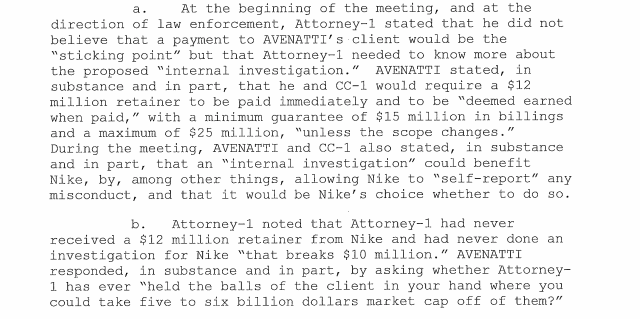T-Mobile and Sprint, the #3 and #4 wireless carriers, would like to combine so as to more effectively compete with Verizon and AT&T, the two dominant players in the cellular service market. Various states went to court against the merger, arguing (dubiously) that the combination would harm consumers and drive up prices. And now, via Reuters, this:
Also on Monday, Nevada said it would withdraw from the lawsuit in exchange for early deployment of the next generation of wireless in the state, creation of 450 jobs for six years and a $30 million donation to be distributed by Nevada Attorney General Aaron Ford and aimed at helping women and minorities, Ford’s office said.
How blatant can you get? The best touch, of course, is the $30 million fund with which to ingratiate lucky beneficiaries around the state. (“The recipients of these grants for the use of the charitable contribution will be at the discretion of Nevada’s attorney general” — that is, the same AG Ford who filed and settled the state’s case, and from whose press release is excerpted that sentence.) It looks a lot like the familiar cozytown set-up in many cities in which permission to build a large development or win a public contract just might call for a hefty donation to a local nonprofit with ties to the mayor and council.
Notwithstanding the best efforts from some quarters to develop per se rules in hopes of generating clear and predictable legal outcomes, antitrust law remains a world of subjective interpretation in which government office-holders are left with great discretion regarding how and against whom to wield enforcement power. Whether you want to call it logrolling or use a less flattering term like “extortion,” the temptation is to trade off antitrust leniency for some of the other sorts of favors business might be able to render government actors.
All of which brings us to presidential candidate Elizabeth Warren’s and other candidates’ new proposals for antitrust, which a CNBC headline accurately reports (as to Warren’s) “would dramatically enhance government control over the biggest U.S. companies.” In particular, the proposals would invite the government far more deeply into oversight of business practices, including refusal to share “essential” facilities with competitors, pricing goods below the cost of production, and much more, as well as mergers and acquisitions.
It’s hard to know whether Sen. Warren sees all this new arbitrary discretion as a bug, or a feature, in her enormous plan. Either way, an accumulation of power that tempting will sooner or later attract appointees seeking either a political whip hand over the U.S. corporate sector, a source of payouts like that in Nevada, or both. [cross-posted from Cato at Liberty]
Filed under: antitrust, Elizabeth Warren, legal extortion, Nevada, WO writings

